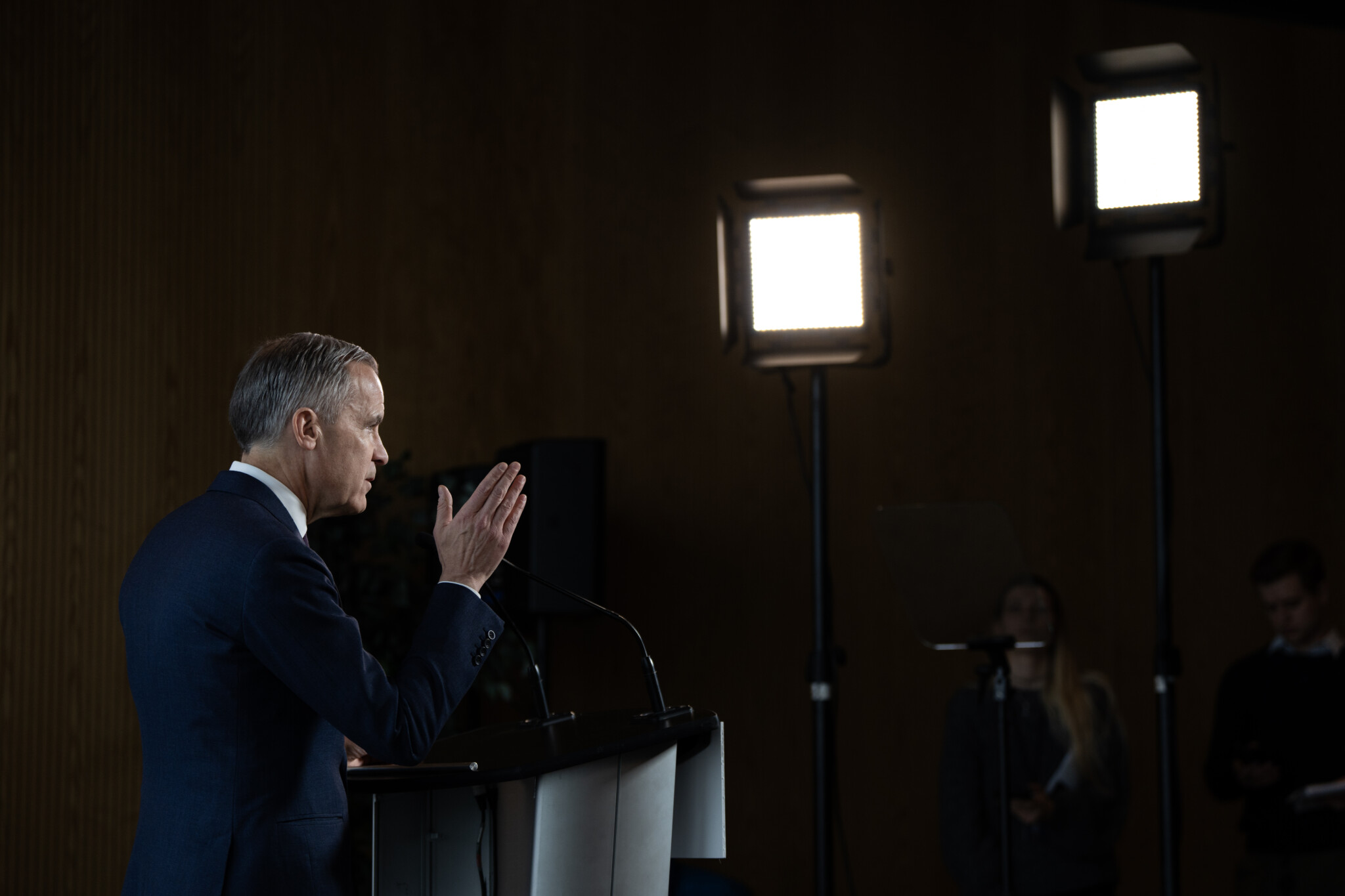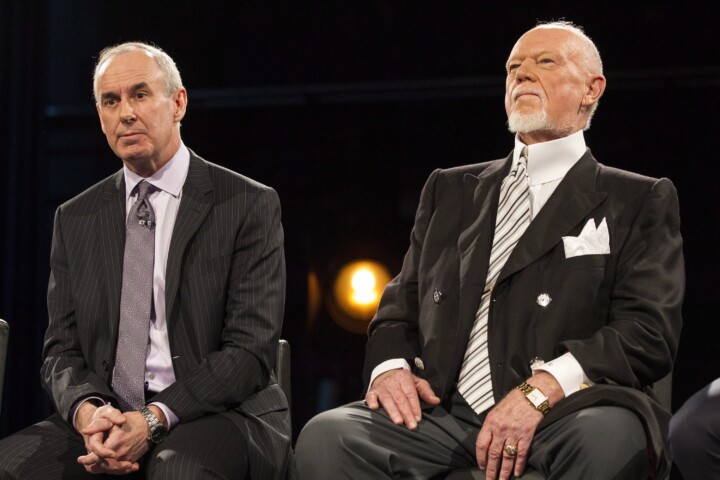Last night marked the final debate of the race to replace Prime Minister Justin Trudeau. Former deputy prime minister Chystia Freeland, former central banker Mark Carney, former cabinet minister Karina Gould, and one-time Liberal MP and businessman Frank Baylis squared off for the party’s English-language debate in Montreal.
While sparks did not fly, the event revealed how each of the candidates view the last nine years of Liberal rule, and how they plan to take on President Trump and Conservative leader Pierre Poilievre.
The Hub has gathered a host of top political experts and insiders to react to the night that was and break down how each candidate performed.
A lacklustre exhibition match
By Darrell Bricker, CEO of Ipsos Global Public Affairs
Last night’s Liberal Party leadership debate was like watching a hockey game where body-checking was banned, nobody wore pads, and the puck was optional. It worked. No hits, accidental or intentional, landed. Calling it anodyne would be an insult to the concept of anodyne.
I felt sorry for the journalists, pundits, and assorted political hangers-on filling air on the post-debate specials. They were left scrambling to extract something—anything—worth analyzing. Instead, they were reduced to parsing facial expressions and tone, manufacturing insights about “energy” and “momentum” that only the most committed Liberal partisans could pretend to see.
The real action in Canadian politics wasn’t inside that sterile debate hall. It was in the polls. After holding a commanding lead for two years, the Conservatives have watched it evaporate. Ipsos, where I work, even had the Liberals nudging ahead by two points. Something that would have seemed unthinkable just a few months ago.
All four candidates on stage knew this before the first question was asked. They understood their true mission: avoid disrupting the coronation, and above all, deny the Conservatives any attack lines against Carney in the next election.
They followed the script to the letter.
Mission accomplished.
Carney is winning over voters—and not just Liberals
By Scott Reid, principal and co-founder of Feschuk.Reid, former communications director for Prime Minister Paul Martin
Let me tell you about my buddy Nelson.
He’s 55 years old. He’s well off. Wants taxes to go down and government to shut up. And until very recently, Nelson intended wholeheartedly to vote Conservative. But now—to no one’s shock more than his own—Nelson’s pretty sure he’s going to vote Liberal. Because of Mark Carney.
I don’t know if my buddy watched Tuesday night’s Liberal Leadership debate. But chances are if he did, he saw the very reason he’s been turned around so quickly and so completely.
For two hours, Carney used the stage to present himself as the purpose-built prime minister that Canada requires at this moment. For large portions of the evening, he wasn’t really at a debate. He was holding an audition with Canadians for the critical task of taking on Trump.
Freeland was better than the night before. Gould was as good as she was in French. But, unleashed in English, Carney took total control of the event—drawing on his unique experience in steering through previous international crises. And building the case for himself as the only candidate—Liberal, Conservative or otherwise—able to confront a rampaging, aberrant U.S. president.
I don’t know how many Nelsons there are out there. But after last night’s debate, I’m betting there are a few more.
Carney correctly identifies the issues—too bad his solutions are just more of the same
By Sean Speer, The Hub’s editor-at-large
The most striking thing about last night’s Liberal leadership debate is the extent to which Mark Carney essentially adopted The Hub’s critique of the Trudeau government’s economic and fiscal policy.
As he set out, his (correct) diagnosis is that the past five years have been marked by unsustainability. The economy has been artificially propped up by the Trudeau government’s unsustainable immigration policy and its unsustainable spending. We’ve similarly argued the government’s focus on extensive growth instead of growth—effectively increasing inputs rather than boosting outputs—obscured the economy’s structural weaknesses. If immigration and public spending were set at more historic (and sustainable) levels, it expose that the economy is stagnant and possibly even contracting.
Yet as notable as Carney’s criticisms of the Trudeau government’s economic record were, his own prescriptions are in conflict with his diagnosis. While he rightly criticized the government’s unsustainable spending growth, he’s proposing to massively increase spending in the name of so-called “investment.” Just declaring that government spending is investment doesn’t change that Carney’s own plan overindexes for debt-financed spending. The results are bound to be the same.
Herein lies the problem with Carney’s candidacy. Even if his diagnosis of the Trudeau government’s failures is correct, his own predispositions ultimately lead him to more of the same.
Sweeping the past nine years under the rug won’t help Canada in a post-Trump world
By Howard Anglin, former deputy chief of staff to Prime Minister Stephen Harper
I understand the obsession with Trump, I really do. And I understand why responding to his tariff threats and his 51st state joke-that-might-not-be-a-joke-and-wasn’t-even-funny-the-first-time is crowding out room for all other issues. But I urge everyone, including Liberals, to remember what they knew just a few months ago: Canada is facing many threats not named Trump, most of them of our own making.
Crime, easy bail, illegal drugs, immigration numbers, lax immigration screening, antisemitic rallies, soaring deficits, ballooning debt, inflation, housing shortages, cost of living: these things all predate Trump. Yet the Liberal leadership debates this week devoted almost no time to them. They will say that this is because Trump’s threats are currently more pressing. That is only half-true. The other reason is that they have no solutions.
The next government, if it is a majority, will outlast Trump, and when he’s gone all these other problems will still be with us. Actually, they will be much worse if we don’t deal with them now. The Liberals want you to ignore all these problems because many of them are official Liberal policy, and they aren’t prepared to do what’s necessary to solve the others.
The Liberals won’t toughen criminal laws, push back on the courts that are soft on violent criminals, stop indulging illegal drug use, slash immigration or improve screening, end woke funding, or cut a penny of wasteful spending. Only a new government will fix these problems, which is why the Liberal debates were designed to keep the candidates, and us, talking about anything but them.
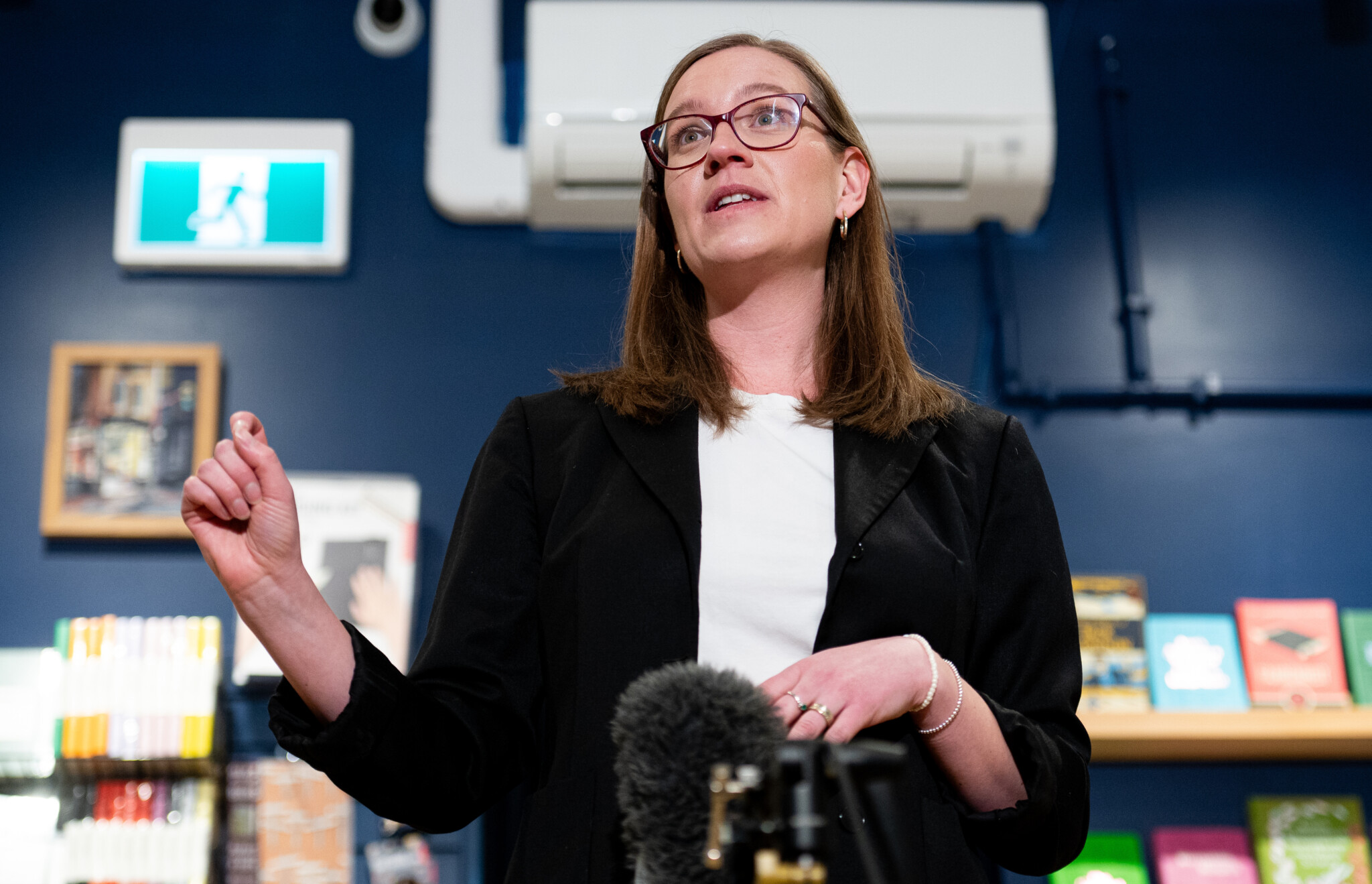
Liberal Party of Canada leadership candidate Karina Gould speaks during an announcement in Ottawa, on Thursday, Jan. 30, 2025. Spencer Colby/The Canadian Press.
Bay Street vs. Main Street
By Jordan Leichnitz, veteran NDP strategist and deputy chief of staff to the NDP leader, now running the Friedrich Ebert Stiftung’s Canadian program
Mark Carney’s performance, while a notable improvement over his stilted French debate, showed him to be smart, pleasant, and entirely inside the Ottawa bubble. Instead of talking in a relatable way about the struggles faced by Canadians in a cost of living crisis, he spoke about the consumer price index and catalyzing productivity. Despite his crash course in retail politics, he still reads as Brookfield rather than Main Street.
Karina Gould shone in an otherwise sleepy debate, with the sharpest elbows and clearest ability to connect to real issues rather than get lost in policy buzzwords. She repeatedly brought the debate back to topics like housing that concern younger voters—the demographic that has fled the Liberals in droves—and spoke with an urgency and clarity that her opponents didn’t match. She’s made the race for second place one to watch.
As for Chrystia Freeland, she made the puzzling strategic choice to redouble her defence of Justin Trudeau’s record. This approach seems unlikely to sell among Liberals eager for change. Her belated acknowledgement that virtue signalling fuels the right-wing rage machine is as correct as it is ironic for someone who was at the heart of many of the Trudeau government’s most visibly out-of-touch moments over the last decade.
An uninspiring yawnfest
By Sabrina Maddeaux, a writer and former candidate for the federal Conservative Party nomination in Aurora—Oak Ridges—Richmond Hill
The headline news is that the Liberal debate was boring—but that’s clearly what it was designed to be. It was never meant to be a feisty battle or even bold exchange of ideas, but a promotional exercise with one simple goal: don’t screw up the party’s polling rebound and don’t undermine the front runner, Mark Carney.
As much as politicos and even the average viewer struggling not to doze off on their couch may dislike this, the night was a win from the party’s perspective. The thing is, it’s a short-term win. Longer term, the Liberals showed they retain all the same flaws that resulted in multiple concurrent crises for Canada and Trudeau’s deep unpopularity.
While I disagreed with much of what Karina Gould said on the debate stage, she clocked one thing right when she said, “The debate so far is indicative of why young people are not supporting the Liberals right now, because we’re not talking about the issues that matter to them.”
The bulk of the debate was spent on the U.S. and Trump, despite there being practically no disagreement on how to oppose him. Meanwhile, housing, an existential issue for the country and young voters, was treated as an aside. The disappearing middle class was practically nowhere to be seen. Immigration wasn’t even a question.
Moreover, none of the candidates made efforts to differentiate themselves from, let alone repudiate Trudeau or his record.
This insular, rally around the Liberal flag attitude may save the party for now, and even pay dividends come election day. But without a bigger appetite for change and risk, or the ability to show they “get it,” they’ll inevitably find themselves right back where they were a few months ago.
Stealing a page from the Poilievre playbook
By John Ibbitson, a writer and journalist
Liberals tuned into Tuesday’s English-language leaders’ debate buoyed by an Ipsos poll that has the party in first place for the first time in years. Many Canadians appear to believe former Bank of Canada governor Mark Carney may be best qualified to get this country through the perilous storm named Hurricane Trump.
But though Carney handled himself well during the debate, Conservatives can take heart, for two reasons.
First, the front-running leadership candidate serially plagiarizes from Poilievre’s agenda of cutting taxes and deregulating the economy to combat the legacy of inflation and unaffordability. “The scale of the increase in spending, and the scale of the increase in the public service, hasn’t been matched by greater productivity,” Carney declared.
But he seeks to lead the party responsible for the country’s problems. That’s a hard circle to square.
Second, he remains a political rookie. His speech was jerky, his language often technical, his energy low.
Canadians are terrified of the threat posed by President Trump. Poilievre has not convinced them he can meet that threat. But he is an experienced leader and Carney is not. And this soporific Liberal leadership campaign is not a federal election that promises to be one of the most crucial, and hardest fought, in this country’s history.
Carney has a steep hill to climb, whatever the polls may say.
Is Chrystia Freeland gunning for second…again?
By Harrison Lowman, The Hub’s managing editor
One of the strangest things missing from last night’s lacklustre party discussion, chock-full of “I entirely agree”s and “I want to thank my colleague”s was Chrystia Freeland’s unwillingness to criticize Mark Carney.
While he is the godfather to her child, politicos imagined this was the moment for the former finance minister, currently in second place, to tear a (small) strip off of the frontrunner former central banker. Instead, she nodded along with his remarks. She then insisted she was the only one who could truly challenge President Trump (he calls her “The Killer” after all), put a 100 percent tariff on Tesla, and said those claiming our economy is not doing well (her fellow competitors included) are parroting Conservative talking points. It was left to Karina Gould, the best performer amongst the four, to go after Carney.
It makes you wonder what Freeland’s epic departure from cabinet and poison letter to Trudeau was all for. Does she actually want the top job, or is she actually happy to again be a second-in-command lieutenant to yet another potential Liberal PM?
Carney, meanwhile, appeared poised, slow and steady, and competent. But he seems utterly incapable of turning it up to 11—displaying the level of urgency, excitement, and charisma needed to rally the nation as tariffs loom. If he stepped up on a soapbox in front of the Peace Tower one imagines the crowd that would gather, taken in by his words, would be quite small. Carney is clearly still reading volume one of “How to be a Politician.” If he wants to lead Canada he’s going to have to get to reading volume four…and fast.
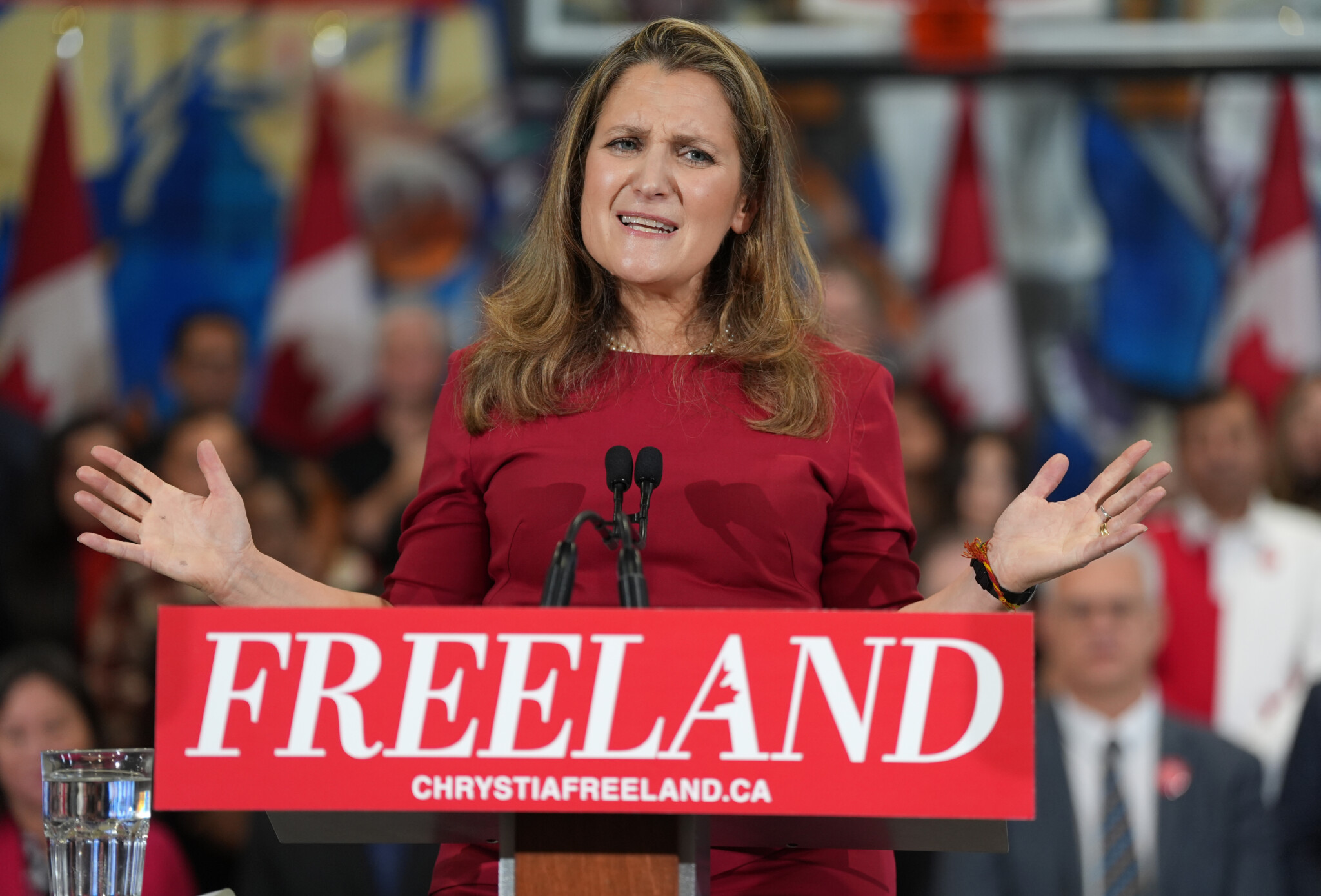
Former finance minister Chrystia Freeland speaks at a press conference in Toronto, Jan. 19, 2025. Frank Gunn/The Canadian Press.
Mark Carney, the undertaker
By Rudyard Griffiths, The Hub’s publisher
Having once organized (and moderated) a federal election debate and dozens of mainstage Munk Debates, here is my quick take on Mark Carney’s performance last night.
To state the obvious, good old-fashioned rhetoric is what wins debates and wins over audiences. And while Carney was substantial on the key issues, he is rhetorically clinical if not cool to the point of leaving this viewer downright cold at times.
This shouldn’t be surprising. The Liberal’s star candidate is showing, in terms of his communication style, the effects of a lifetime of announcing quarter-point interest rate changes in the monotone that is central bank speak. The dark grey suit and slicked-back hair also didn’t help what came across as a kind of undertaker vibe to Carney: grave, sombre, almost spectral. Maybe voters freaked out by Trump’s tariff threats are looking for a cool, papery hand to guide them gently to the visitation room for the Canadian economy, driven to a death of despair by the Liberal’s decade of mismanagement.
I jest, but only partly. Last night’s debate to me suggests an opening for Pierre Poilievre. If the Conservative leader can inject real energy, humour, and dynamism into his public persona, he could not only handily win the election debates, he could well end up running away with the campaign. In sum, Carney is vulnerable not so much on substance but on style, and in our digital, algorithmically driven, low-information voter age, this matters, big time.
Game on
By Marc Kealey, president of K&A Inc., a Canadian public policy, research, and management consultancy and a former aide to Liberal Prime Minister John Turner
With the March 9th voting date set, the Liberal Party tested its confirmed candidates at last night’s English language debate.
Some 400,000 Liberals will vote by a “ranked ballot” which replaces the delegated convention that elected Turner in 1984, Chretien in 1990, Martin in 2003, and Dion in 2008.
History tells us the stakes are high. Trudeau’s father announced his resignation, and his replacement would eventually become PM. The aspirants to this 2025 “race for the rose” are no less qualified and our new leader will become PM.
What’s fascinating is just how transformational the race’s dialogue is for party members and the public—seeping into political discourse and attracting support for the once-fading Liberals. Where the leader of the Conservatives once seemed to enjoy unprecedented support among polled Canadians, the quality of the Liberal debates and their campaigns appears to be sapping support away from Poilievre.
The impact of President Trump’s White House is seismic. The battle for the 49th parallel has set the tone for this race and the debate showcased strength and vision. The debates showcased just how vulnerable Poilievre’s lock on victory is—or was.
Mark Carney, whom many believe will win, showcased the kind of composure Canadians embrace—polling numbers are testament to that. Chrystia Freeland was measured and confident. Karina Gould showed that she has the wherewithal to convince Canada that Canada is in good hands.
I believe Liberals see a light at the end of the tunnel. The leadership race will undoubtedly elect a leader as yin against the seemingly haughty yang of Poilievre. Liberals are ready for this challenge and they will rise to the occasion—so will Canadians come the next election.
Not so fast
By Anthony Koch, managing principal of AK Strategies who served as the national campaign spokesperson for Pierre Poilievre’s leadership campaign
Yesterday’s Liberal Party of Canada leadership debate once again proved that Mark Carney is that guy in every business meeting who speaks in vague unobjectionable nonsense jargon without saying anything substantive or meaningful. While he avoided the cliché “circle back,” his entire performance was a parade of corporate buzzwords that sidestepped any real plan to tackle the most pressing issues facing Canadians.
More glaring than his vacuous rhetoric, however, is his misleading claim about stepping down as Brookfield’s chair before the company shifted its headquarters from Toronto to New York City. This move raises uncomfortable questions about Carney’s corporate career, suggesting he’s more confident in America’s economy under Trump than the one he built himself alongside Trudeau.
Chrystia Freeland, once hailed for her negotiation skills, looked completely out of her depth by comparison—though that’s not saying much. Her performance was so uninspired, it’s hard to imagine even her staunchest supporters walking away with any confidence.
What stands out most is the Liberals’ consistent refusal to address the real concerns of everyday Canadians. Crime is on the rise, the drug crisis continues to worsen, and immigration policy remains a mess—yet none of these issues earned any real mention. At this rate, the so-called “leadership” on display is hardly worthy of the name.
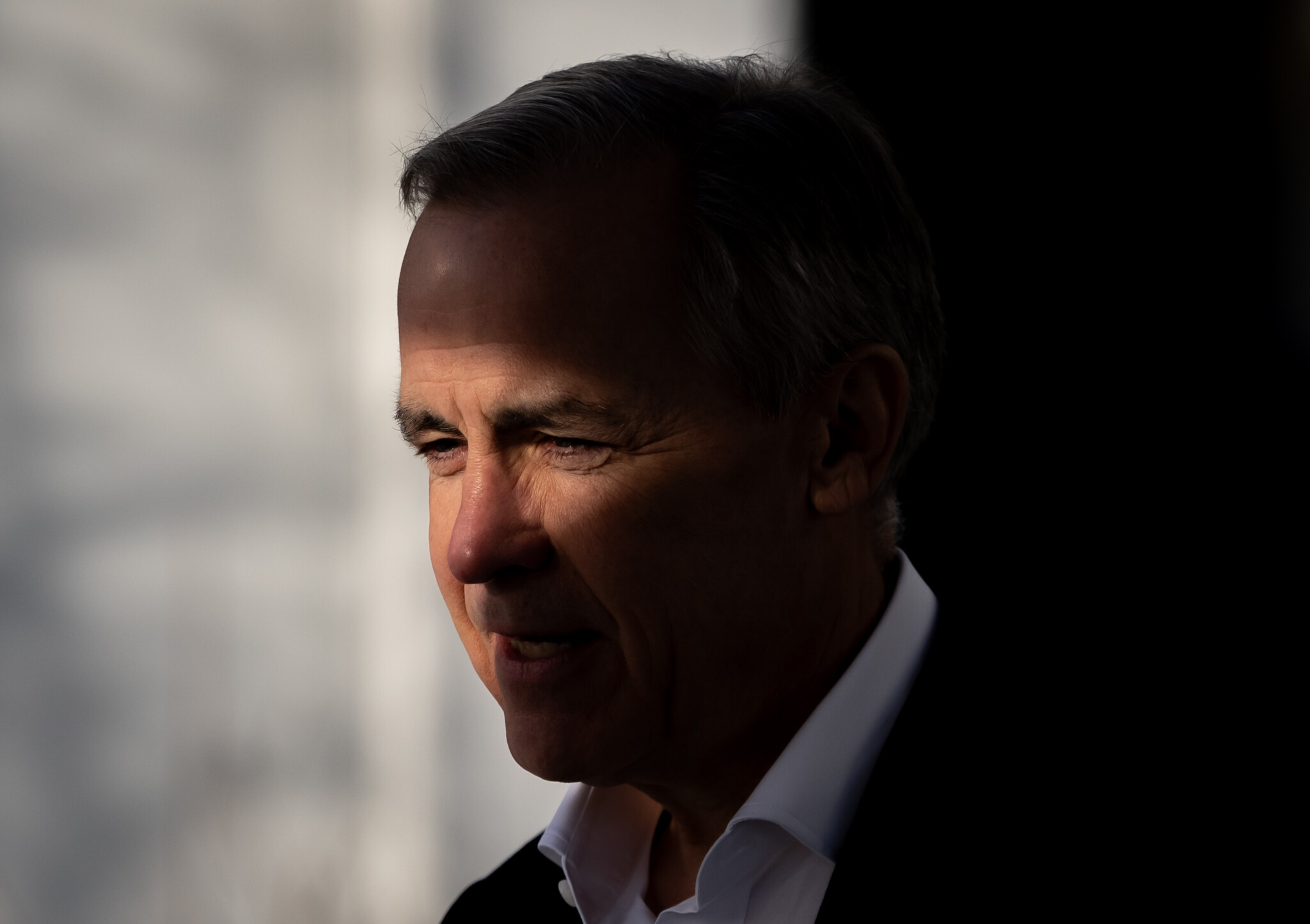
Mark Carney, candidate for the leadership of the Liberal Party of Canada, arrives during a news conference in Vancouver, B.C., Thursday, Feb. 13, 2025. Ethan Cairns/The Canadian Press.
A bad Fantasy Island remake
By Garry Keller, vice president at StrategyCorp and former chief of staff to John Baird, former foreign affairs minister
“Look boss, the plane! The plane!”
After watching last night’s English language Liberal leadership debate, I felt as if I was watching a new version of the ‘70s TV show Fantasy Island.
It’s remarkable watching Liberals for the last six weeks memory-hole a record of nine years of policies that magically appeared on someone else’s watch.
Seeing Mark Carney, Chrystia Freeland, Karina Gould, and Frank Baylis talk enthusiastically about fixing the immigration system! Spending dramatically on defence and meeting our 2 percent commitment in two years! Building pipelines from coast to coast! And wrapping themselves in the Canadian flag after nine years of a Liberal government insisting that Canada was a racist, colonial, post-national state certainly requires one to suspend some semblance of reality.
At least Gould acknowledged that there were some mistakes made along the way, and (shocking!) that Liberals weren’t perfect. To her credit, she was the only one willing to get her elbows up slightly and remind Carney that people in the real world don’t stay up at night worrying “that government capital investment dollars catalyze multiple times their value in private investment.”
Yet here we are, post-debate.
It’s clear that Liberals are parking their leadership vote with Carney because in their eyes he does represent change from the last nine years of Trudeau Liberalism. The debates will likely have little impact on who wins (but might push Gould into second place).
The question will be on how that translates amongst the general population. There’s no doubt the polls have narrowed, and the new reality is that Canadians are increasingly viewing the horse race as not between Carney and Poilievre, but Carney vs. Trump and Poilievre vs. Trump.
The challenge for Pierre Poilievre is to refocus that debate—to reinforce that choices matter. Elections matter. And, during this difficult time, who has the better vision for the country matters. All while reminding Canadians that today’s policy failures are rooted in a record that Carney will have to defend.
After last night’s non-event, I think it’s even more fair to say, “Game on.”
